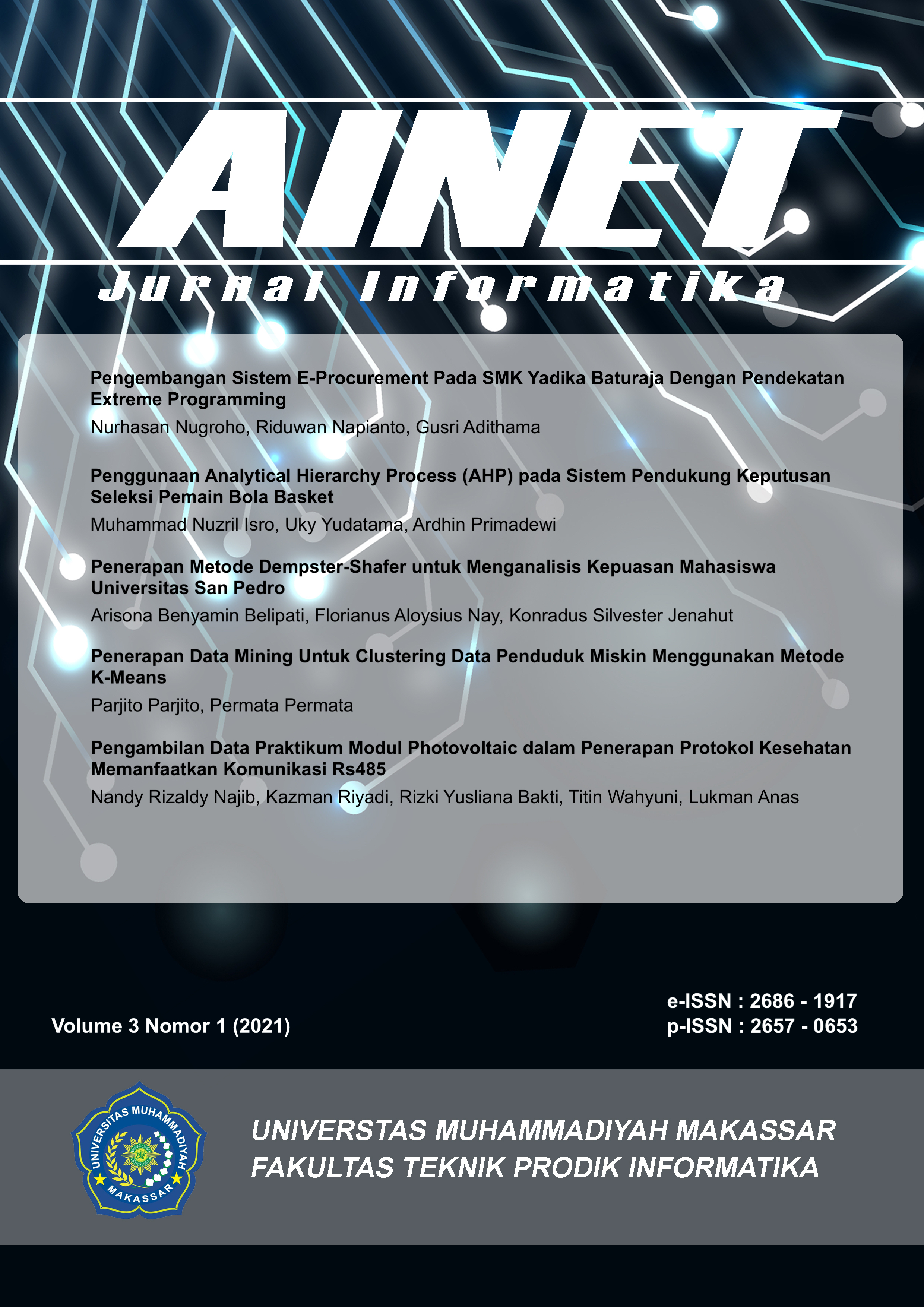Penerapan Data Mining Untuk Clustering Data Penduduk Miskin Menggunakan Metode K-Means
DOI:
https://doi.org/10.26618/ainet.v3i1.5878Keywords:
Data Mining, Clustering, K-Means, Poor Society, Social AssistanceAbstract
Poverty that occurs in the community is a major problem that must be an important concern for the government in any country in various provincial, district and city governments, such as providing assistance to the poor in the form of allowances that can relieve the community and help the community, Community Health Insurance, Rice for the Poor (Raskin), Education Cost Assistance for Academic Achievement Improvement (BBP-PPA) Tuition Fee Assistance which is only intended for prospective students who are unable or poor (BIDIKMISI), and other programs that can help the poor, but in reality the problem of poverty cannot be overcome. Suka Bhakti Village carried out grouping of poor and non-poor communities based on basic determinant variables, namely the latest education of members or family heads, ownership of several family assets, total family income from both the head of the family and a combination of family members, the area of the building owned, the type of floor used, and the type of wall. The use of data mining with cluster techniques through the K-Means method can group community data to get clusters that should be able to receive social assistance from the government. The results of the validity calculations carried out, the results obtained for the number of cluster 1 are 130 data and for cluster 2 are 682. Testing this data is carried out using the Davies-Bouldin Index (DBI) method. The resulting number of suitable clusters is 2 clusters with a value of 0, 1643 which means that the cluster is suitable for grouping community data.Downloads
References
Widjajanti Isdijoso, A. S. (2016, September). Smeru Research Institute. Dipetik November 21, 2019, dari Penetapan Kriteria dan Variabel Pendataan Penduduk Miskin yang Komprehensif dalam Rangka Perlindungan Penduduk Miskin di Kabupaten/Kota: https://www.smeru.or.id/id/content/penetapan-kriteria-variabel-pendataan-penduduk miskin.
Khomarudin, A. N. (2016). Teknik Data Mining: Algoritma K-Means Clustering. Ilmu Komputer.
Sigit adinugroho, Y. A. (2018). Implementasi Data Mining Menggunakan Weka. Universitas Brawijaya: UB Press.
Purba, J. (2015). Pengelolaan Lingkungan Sosial. Jakarta: Yayasan Obor Indonesia.
R. I. Borman and M. Wati, “Penerapan Data Maining Dalam Klasifikasi Data Anggota Kopdit Sejahtera Bandarlampung Dengan Algoritma Naïve Bayes,” J. Ilm. Fak. Ilmu Komput., vol. 9, no. 1, pp. 25–34, 2020.
Derick Iskandar, Y. K. (2013). Perbandingan akurasi klasifikasi tingkat kemiskinan antara algoritma C4.5 dan Naïve Bayes Clasifier. JAVA Journal Electrical and Electronics Engineering.
R. I. Borman, B. Priopradono, and A. R. Syah, “Klasifikasi Objek Kode Tangan pada Pengenalan Isyarat Alphabet Bahasa Isyarat Indonesia (Bisindo),” in Seminar Nasional Informatika dan Aplikasinya (SNIA), 2017, no. September, pp. 1–4.
Annur, H. (2018). Klasifikasi Masyarakat Miskin Menggunakan Naive Bayes. ILKOM Jurnal Ilmiah.
I Made Rian Yuliawan, Duman Care Khrisne, Putu Arya Mertasana. “Penerapan Algoritma K-Means Clustering dalam.” Jurnal SPEKTRUM , 2019 .
Kahar, N. F. (2015). Penentuan Tingkat Kemiskinan Dengan Metode Fuzzy C-means di Kabupaten Bone Bolango. Journal Teknik.
Y. Rahmanto, J. Alfian, and R. I. Borman, “Penerapan Algoritma Sequential Search pada Aplikasi Kamus Bahasa Ilmiah Tumbuhan,” J. Buana Inform., vol. 12, no. 1, pp. 21–30, 2021.
R. I. Borman, I. Yasin, M. A. P. Darma, I. Ahmad, Y. Fernando, and A. Ambarwari, “Pengembangan Dan Pendampingan Sistem Informasi Pengolahan Pendapatan Jasa Pada PT. DMS Konsultan Bandar Lampung,” J. Soc. Sci. Technol. Community Serv., vol. 1, no. 2, pp. 24–31, 2020.
P. Prasetyawan, I. Ahmad, R. I. Borman, A. Ardiansyah, Y. A. Pahlevi, and D. E. Kurniawan, “Classification of the Period Undergraduate Study Using Back-propagation Neural Network,” in Proceedings of the 2018 International Conference on Applied Engineering, ICAE 2018, 2018.
R. D. Gunawan, T. Oktavia, and R. I. Borman, “Perancangan Sistem Informasi Beasiswa Program Indonesia Pintar (PIP) Berbasis Online (Tudi Kasus : SMA N 1 Kota Bumi),” J. Mikrotik, vol. 8, no. 1, pp. 43–54, 2018.
Karyadiputra, E. (2016). Analisis Algoritma Naive Bayes Untuk Klasifikasi Status Kesejahteraan Rumah Tangga Keluarga Binaan Sosial. Technologia.
Prasetyo, Eko. Data Mining Mengolah Data Menjadi Informasi Menggunakan Matlab. Yogyakarta: Andi, 2014.
Ulfah, A. N. (2014). Analisis Kinerja Algoritma Fuzzy C-Means Dan K-Means Pada Data Kemiskinan. Journal Sains And Technologi.
Yuliawan, I Made Rian. “Penerapan Algoritma K-Means Clustering dalam.” Jurnal SPEKTRUM, 2019.















